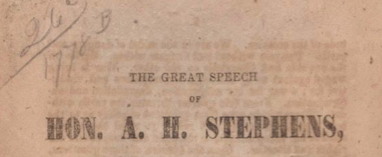The Part of the Alexander Stephens’s Cornerstone Speech that (Usually) Doesn't Get Quoted
Over the course of the school year, I have my advanced Civil War students (and all the rest, really) do close reads of important primary sources. Naturally, as my teacher colleagues will most certainly agree, this is the very best way to get to the heart of understanding the sentiments of historical actors - to try and discern why they did what they did. In an effort to figure out the cause for secession and to comprehend the rationale behind establishing the Confederate States of America, I have them read Alexander Stephens’s infamous Cornerstone Speech, which he gave before a crowd gathered at the Savannah Georgia Athenaeum on March 21, 1861. Those of you familiar with the speech will probably guess which part hits home every single time I assign it:
“Our new government is founded upon exactly the opposite idea; its foundations are laid, its corner-stone rests, upon the great truth that the negro is not equal to the white man; that slavery subordination to the superior race is his natural and normal condition. This, our new government, is the first, in the history of the world, based upon this great physical, philosophical, and moral truth.”
It seems an open and shut case. The Confederate States of America was founded upon the principles of racial inequality and white supremacy. This is the quote that pretty much anybody with any sense will return to when challenged by Confederate apologists over the rationale behind the Confederate bid for independence. But here’s what I ask my students: what is this “opposite idea” of which he spoke? The answer somewhat problematizes what many today will suggest about the founding of the United States.
Today, some assert that the United States of America was founded upon the principles of racial inequality and white supremacy. Scholars, journalists, and politicians tend to toss this statement out there as if it is accepted fact. But the thing is…those who explicitly framed their ideas and their actions around white supremacy in 1861 would have thought otherwise. Here’s another quote from the speech that deserves the equal attention it rarely gets:
“The prevailing ideas entertained by [Thomas Jefferson] and most of the leading statesmen at the time of the formation of the old constitution, were that the enslavement of the African was in violation of the laws of nature; that it was wrong in principle, socially, morally, and politically. It was an evil they knew not well how to deal with, but the general opinion of the men of that day was that, somehow or other in the order of Providence, the institution would be evanescent and pass away. This idea, though not incorporated in the constitution, was the prevailing idea at that time. The constitution, it is true, secured every essential guarantee to the institution while it should last, and hence no argument can be justly urged against the constitutional guarantees thus secured, because of the common sentiment of the day. Those ideas, however, were fundamentally wrong. They rested upon the assumption of the equality of races. This was an error. It was a sandy foundation, and the government built upon it fell when the “storm came and the wind blew.””
The “prevailing idea” of equality of the races, at least as understood by newly minted Confederates, serves to complicate things a little. I think it is safe to assume that many of the founding generation had an interest in maintaining some sort of racial hierarchy. But I am less convinced that their founding principles functioned expressly to establish white supremacy for all time, as many have argued. Did the founders’ ideas in fact transcend the notion of racial inequality, and thus provide the framework for a potential challenge to white supremacy? It was certainly enough of a truism in March, 1861 to help push (at this point) seven states out of the Union.
To be quite honest, the principles question is one with which I regularly grapple…and suspect my students do the same. But it is a question worth asking. My analysis of the Cornerstone Speech, and other early Rebel iterations, has made it quite clear that white southerners understood a salient problem: the pre-secession United States government did not have the explicitly stated principles, much less the policies in place, to to maintain white supremacy indefinitely…and it was up to the new Confederate nation to correct where the founders had gone wrong. They were going to keep the abolitionist fanatics from perverting what Stephens claimed was a racial hierarchy ordained by God.
So let’s perhaps rethink things. Sure, the majority of the founders were racist by our standards. And…I’ll bet my next paycheck on the fact that a bunch of them had a real interest in maintaining some sort of racial hierarchy. But if that was the case then they were not so explicit...and the seceding Confederates took notice. The founders had left doors ajar - doors that Civil Rights leaders, both black and white, would open in the future and force the issue to make good on the stated principles of the United States - principles that do indeed point toward “equality.” It was these doors that Confederates meant to close with their “more perfect” Constitution. Stephens noted: “All fanaticism springs from an aberration of the mind from a defect in reasoning. It is a species of insanity. One of the most striking characteristics of insanity, in many instances, is forming correct conclusions from fancied or erroneous premises; so with the anti-slavery fanatics.” From Stephens’s perspective, the founders’ reasoning was flawed, and most importantly, it threatened the cornerstone of white southern society.

